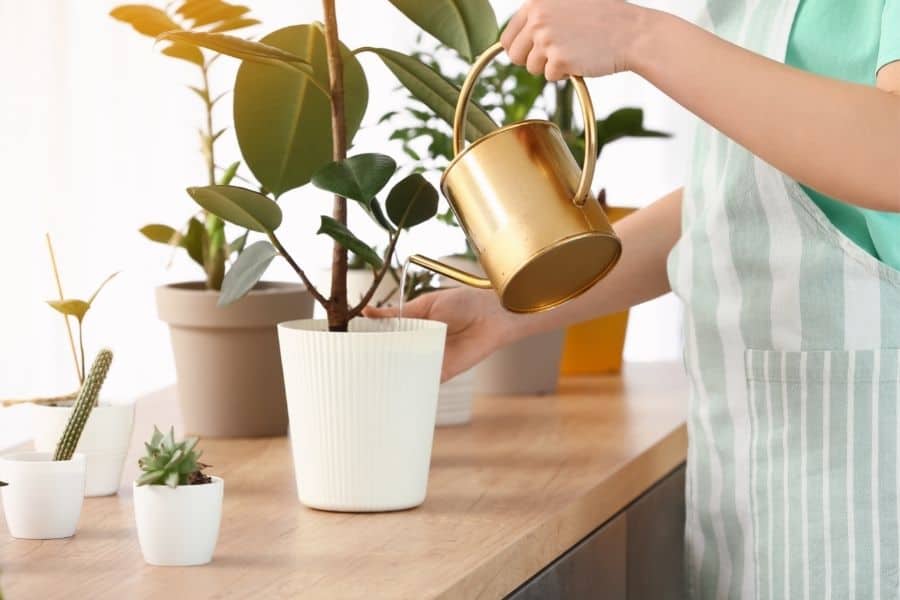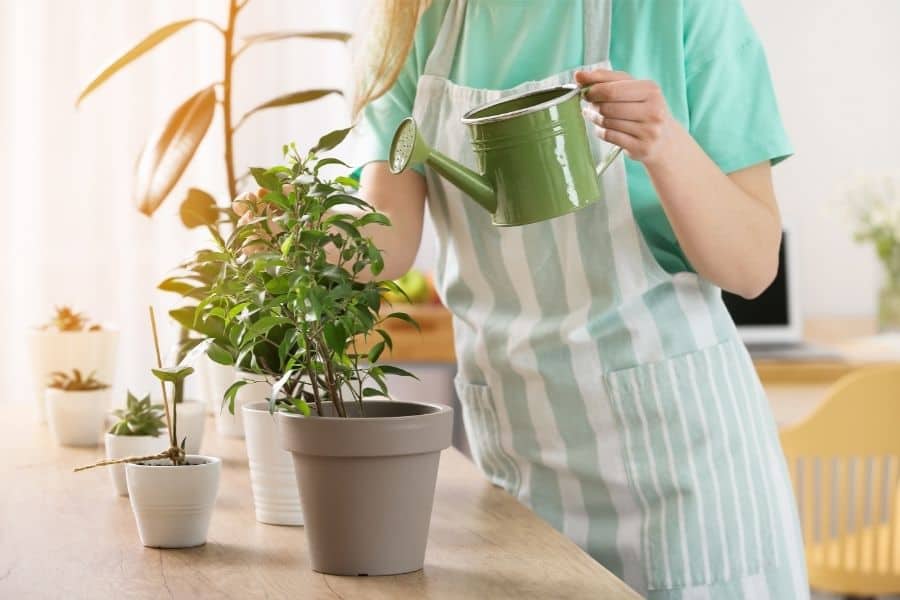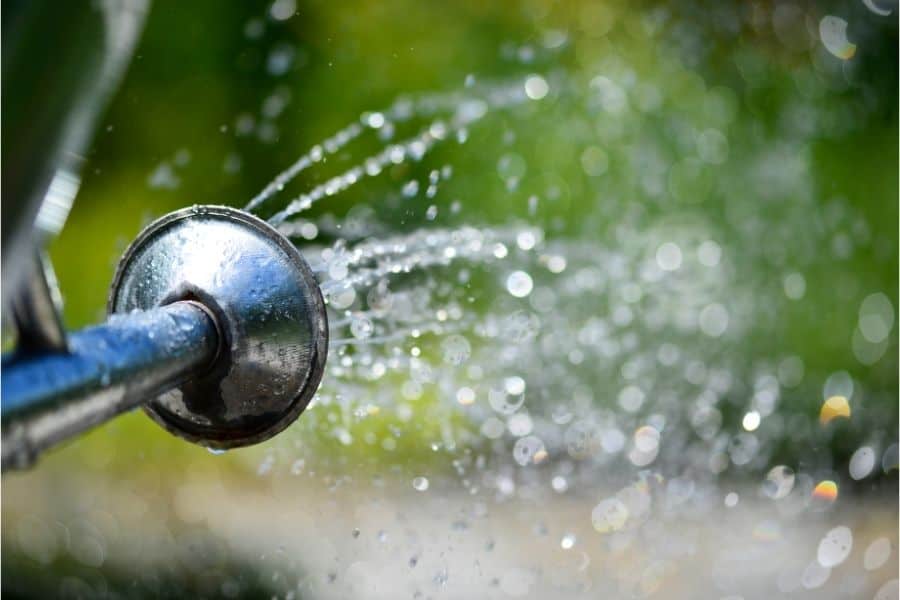Warning: Never Use Soft Water On Your Plants
Soft water can do wonders. From reducing the amount of soap used in washing clothes to extending the water heater’s life, there are tons of things soft water can do. But can soft water be used on plants?
Long story short, no matter how useful it is for other domestic purposes, soft water is harmful to your plants in the long run. And it can cause damages that can’t be undone.
But what’s soft water, and why is it not safe for plants? Well, that’s precisely what this piece is all about.
From “what’s soft water?” and “why you must not use it on your plants?” to “its alternative” – today we’ll cover everything.

What Is Soft Water?
Soft water is a type of water that’s been treated through an ion-exchange process to remove harsh minerals. These minerals, if not removed render the water harmful – especially for plants.
During the ion-exchange process, water loses calcium, magnesium, iron, and other dissolved minerals and metals. And instead, it gets enriched with sodium chloride commonly known as table salt.
There are many applications of soft water. But using soft water on your plants isn’t one of them.
Do you want to know why? Check out the next section.
Why Not Use Soft Water On Your Plants
Softened water isn’t the right choice for the majority of plants. Why? It’s simply because the excess salt added to the water during the ion exchange process is simply too much for plants, including succulents.
Although the soft water itself might not be salty in taste for us humans, plants certainly don’t like it.
Most water softeners use sodium chloride as a salt solution to soften the water. In the long term, this can cause a gradual build-up of sodium in garden soil. Eventually, causing growth and other problems in plants.
If you water your plants with soft water, a layer of salt will start to build up across the soil bed. And just like that, the soil will clog in the pores and roots, restricting the way for healthy nutrients and water to reach the bottom of the plant.
That’s not it; if the salt level in your soil bed gets too high, your garden will soon become unsuitable for any kind of vegetation.
According to Salinity Management, 70 mg per liter is the highest level of acceptable sodium in water. In plant tissue, it is 5% and when it comes to soil, it is 230 mg per liter. Anything beyond that may result in some sort of injury to the plant.

Best Alternative? Salt-Free Water Softeners
Okay, so now that we know that soft water isn’t actually going soft on our plants – what should we do?
Well, as there’s a solution to every problem in the world, we have one for you as well. And that comes in the shape of the best salt-free water softener.
Salt-free water softeners don’t actually remove minerals from water but reduce the scaling effects of hard water without eliminating calcium and magnesium.
You can think of salt-free water softeners as a piece of equipment to condition the water for your plants—more on why you should use salt-free water softeners up ahead.
Why Use Salt-Free Water Softeners?
- Unlike salt-based water softeners, salt-free water softeners condition the water to reduce its scaling effects without actually eliminating minerals like iron, magnesium, and calcium.
- Salt-free water softeners don’t use an ion-exchange process to deposit sodium or potassium chloride in the water. Instead, they just condition and revamp the quality of water to make it healthier for plants.
- Water coming out of salt-free water softeners is like an improved version of hard water. This water has all the natural minerals required by the plants for healthy growth with no excess of harmful salts.
- Salt-free water softeners or salt-free water conditioners give water, which is free from extra salts. And the best thing is, they don’t require much maintenance either.
Now that you know that salt-free water softeners are the best alternatives for regular water softening system, you must know about their types. Here are its three main ones.
Types of Salt-Free Water Softeners
Salt-free water softeners come in different shapes and sizes based on various technologies. Needless to say, not all salt-free water softeners work the same way.
Here are three popular technologies you’ll find in salt-free water softeners:
TAC
TAC or Template Assisted Crystallization technology can prevent scale buildup by more than 99% if applied correctly.
In a TAC-based salt-free water softener, the water flows through a catalytic media that crystallizes and suspends calcium and magnesium ions in the water. This makes the water both salt and harsh minerals free.
The TAC technology has proved to provide the best performance and ease of use.
Electro-Magnetic
Many salt-free water softeners use electromagnetic technology. This technology uses electricity or plain magnets to alter the harmful and adhesive properties of harsh minerals in water by creating a magnetic field in the water supply.
Also known as water descalers, electro-magnetic salt-free softeners do their job well and produce A-quality water for plants.
Chelation
Last and certainly not the least are chelation-based softeners. These systems use chelating agents on water for stabilizing minerals like calcium, magnesium, and iron.
Chelation-based salt-free water softener systems are quite popular amongst users. But we have mixed reviews over their efficiency.

In Summary
Using soft water on your plants is like slowly and gradually killing them. Hence, we recommend you not to use it to water your plants. Soft water is just too rich in sodium that can be unhealthy in the long run.
Instead, use water processed by a salt-free water softener as it doesn’t contain extra salt and has stabilized harsh minerals that don’t affect the growth of your plants.
Lastly, remember that salt-free water softeners don’t eliminate salt but reduce the scaling effects of hard water without removing calcium, magnesium, iron, and other harsh minerals. So, it’s like processing the water without making it lose its essential elements.
